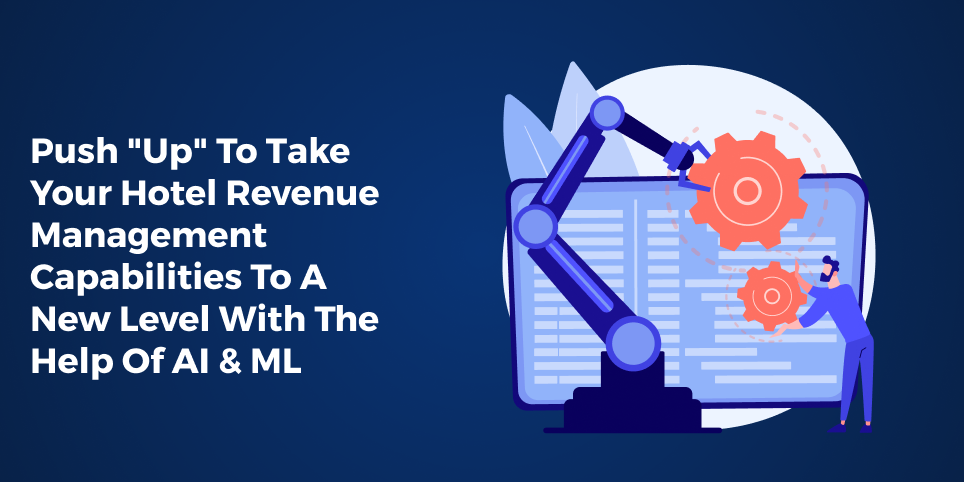
Push “Up” To Take Your Hotel Revenue Management Capabilities To A New Level With The Help Of AI & ML
Table of Contents
Artificial Intelligence, as a technology, has been around the corner for decades now. But its integration or proliferation into different businesses was initiated quite recently with the rise in the computing power of advancement in cloud computing, deep learning, machines, etc. for various companies.
AI has emerged as the medium to predict sales, strengthen marketing, simplify the process, and improve the overall experience for various B2C companies. Also, it has enhanced customer satisfaction by offering round-the-clock support instantly and recommending products. The complexity and speed of the pricing decisions, as well as the financial outcomes they produce, are unmatched by maximum seasoned revenue managers.
Let us delve into the nuances and the impact of AI on the hotel industry in terms of enhancing guest experiences and boosting hotel operational efficiency.
AI making inroads into the hotel operations
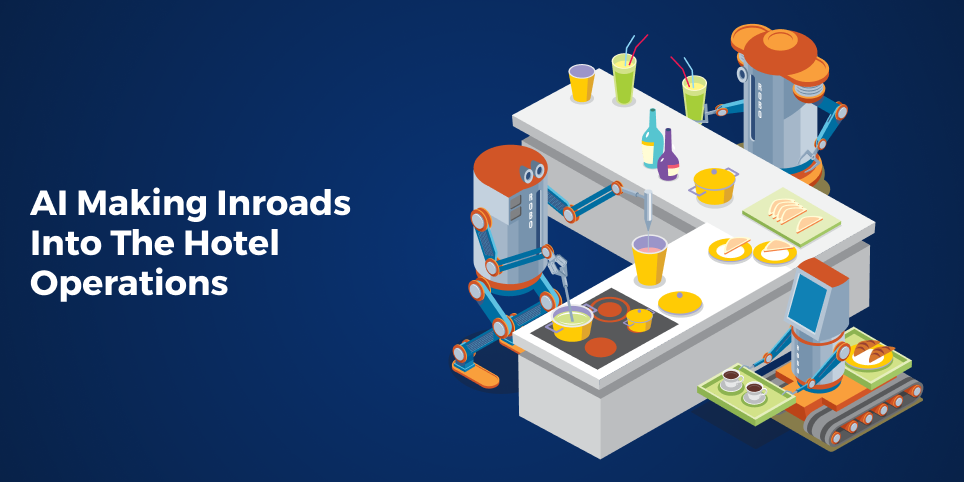
Automation has become a driving force in the evolution of revenue management. Leveraging advances in machine learning and artificial intelligence, today’s best solutions make rate updates and pricing decisions automatically. With the guests of the hotel today becoming extraordinarily demanding, also with the evolvement of the competitive landscape, to stay relevant, hotels have to gain the essential edge. This is possible only by exceeding guest expectations by automating the process. Offering personalized services to the guests, boosting revenue, and improving operational capabilities are some driving factors that have led to the swift adoption of AI in the hotel industry. The ability to integrate new sources of data also played a crucial role in driving smarter pricing decisions. Advanced revenue management solutions leverage the historical data repository in a hotel’s property management system and, in many cases, the vast array of marketing intelligence from the competitor rates data for booking trends data. This accurately forecasts demand and increases profitability and hotel revenue in unprecedented ways.
AI in the guest service of the hotel
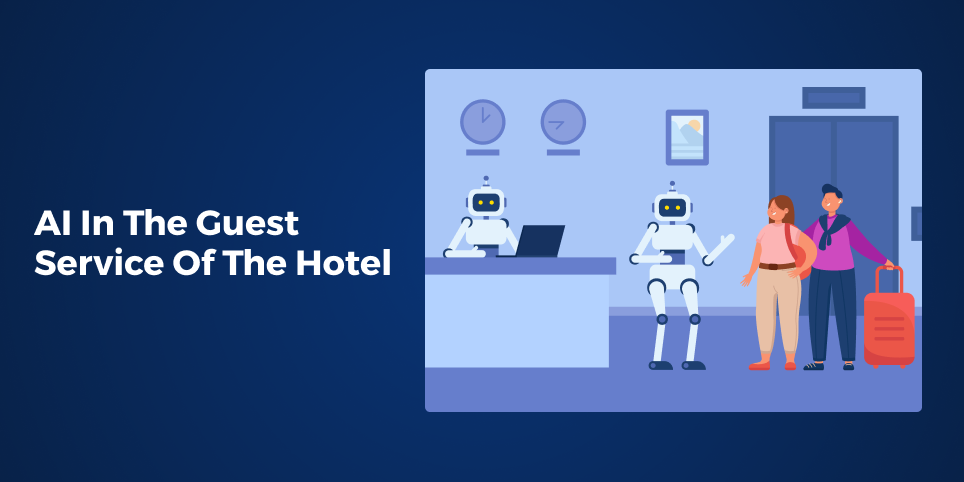
From assisting prospective guests with their inquiries with a chatbot or guiding the in-house guests with the help of a robot, AI has been helping hotels in everything. Hotels can leverage conversational AI to automate the total process of guest-facing communications. It helps the hotels stay in touch 24/7 with their guests during, before, and after their stay. Various AI-driven hospitality technology keys, including voice assistants, concierge robots, chatbots, etc., are able to track guest behavior and interactions. AI chatbots can sense the setting of the queries and then mechanically match them with the guests’ past data to provide an expected and relevant response. It permits the hotels to collect huge amounts of guests to understand them better, thereby providing them with the things they wish for a memorable practice.
AI in hotel marketing
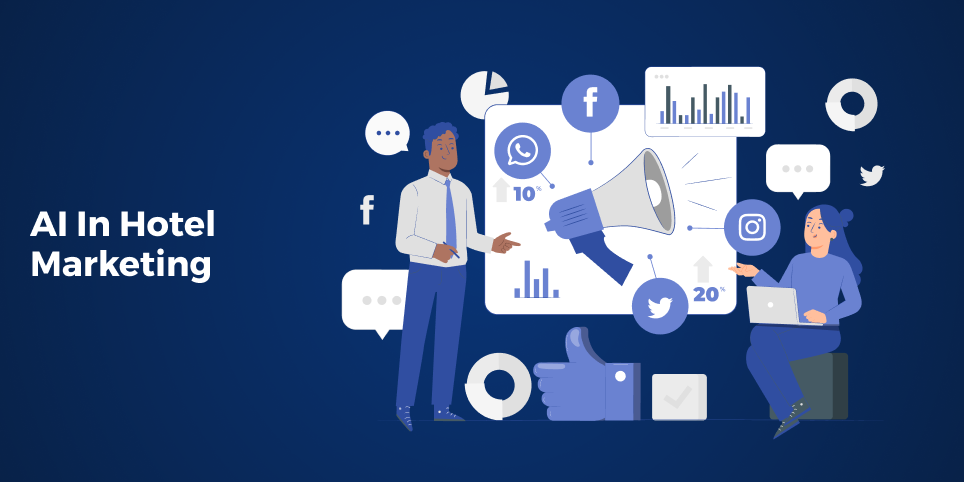
There has been a rise in adopting AI-powered CRM (Customer Relationship Management) applications in hotels. So, in this context, smart cloud-based Hotel PMS (Property Management System) plays a significant role also. An AI-powered CRM tool can be integrated to allow hotels to engage with their guests from the start through timely pre-arrival and in-stay messages. The valuable tech combination is also vital to roll out targeted cross-sale and up-sell. Also, it lets them collect feedback from the guests, which can be used to improve the brand’s reputation. Here, the crux is that Cloud PMSs record information in detail at the time of the guest journey that is then used effectively by the AI-powered CRM to improve their conversion rates through robust data-driven marketing efforts.
The business intelligence that is gleaned from reporting capabilities can help in providing valuable insights into channel profitability, market positioning, guest demographics, and occupancy trends, generate competitive intelligence, and improve sales effectiveness. The forecasts can be used as a guide by the marketing department to determine when to increase the promotional spend to the spur spend. The operations team can know when to decrease and increase staffing based on project occupancy.
AI in the management of hotel revenue
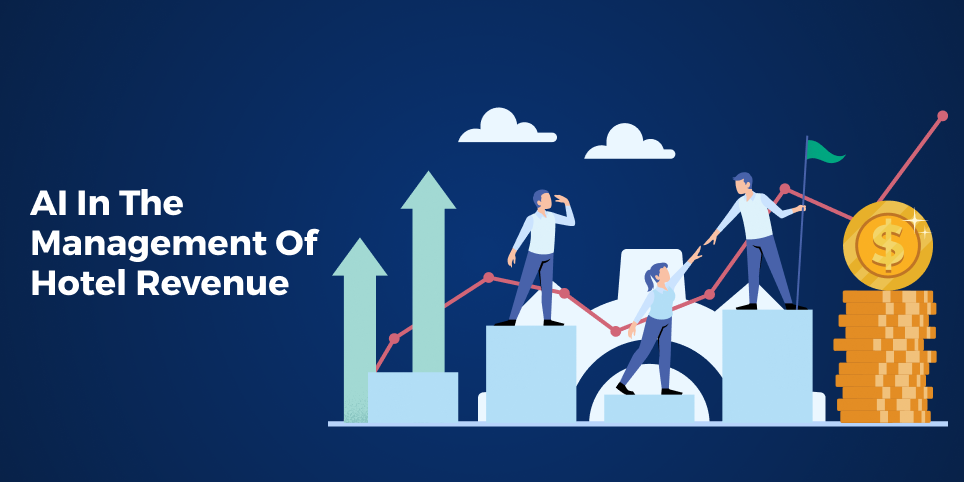
It is said that the hotel industry used AI best in revenue management. It is all about mechanizing the process of finding the correct pricing at the correct time for the correct guest, considering the demand forecasts, price sensitivity of guests, also competitor pricing. Also, the system processes various other demand drivers and relevant information, including length of stay, occupancy rates, local trade/event shows, seasonality, and all to alter the room rate dynamically. It permits the hotels to ensure enhanced room revenue and occupancy.
It is able to tweak prices in real-time, powered by AI for enhanced RevPAR. Apart from room revenue, occupancy-based dynamic pricing also permits the hotels in optimizing their non-room revenue by considering the potential of the guests intelligently to spend on gift shops, gyms, spas, F & Bs etc. everything empowers the guests in configuring the correct prices for generating more revenue. With the hotel revenue management systems, which are AI-powered, the complex price of hotel management has now become quite simpler.
The AI-powered next-generation revenue management system has been taking the industry by storm. Most of the prominent AI-powered solutions replace the legacy solutions, which use a rules-based, hands-on approach to generate pricing decisions, now generating more than 100 million decisions over tens of thousands of properties every day. With the major brands viewing their revenue number rise by millions of dollars yearly, the results are quite impressive. Smaller properties are viewing substantial gains, too, in some cases that drive the incremental sales lift by over 15%.
To empower a hotel with the ability to make smarter pricing decisions in an automated fashion makes a case for businesses to invest in a revenue management solution that is AI-powered and compelling in terms of driving increased profitability. Also, it is compelling in terms of prevention of the potential revenue loss, which may result when any hotel fails to experience a loss in occupancy and maximize occupancy.
Robotics in Hospitality
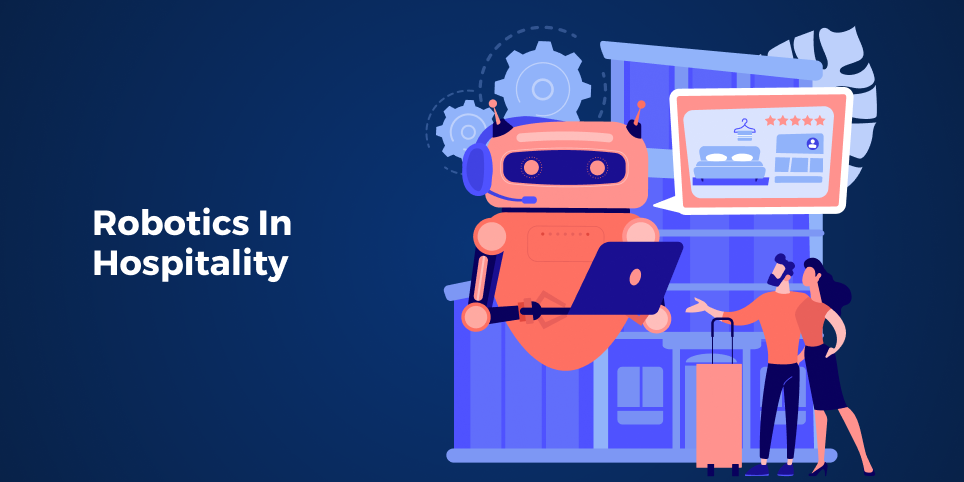
Robotics in hospitality has become quite prevalent and aimed at improving the guests’ experience. Hotels are utilizing robotic technology increasingly to enhance the guest experience and improve operations. With apps, touchscreens, smartphones, the upcoming robot revolution, and AI, guests nowadays accept robotics in hospitality. At the touch of a single button, guests want answers and information. Thanks to advances in machine learning and the advent of IoT, this has led to the technology to meet the need for instant gratification.
The robots are designed to deliver items to the guest rooms, including toiletries, towels, and other amenities. Also, guests may use robots to recycle unwanted items or request housekeeping services. The outcomes have been quite impressive. Robots help reduce the wait times of the guests and improve the efficiency of housekeeping operations. Moreover, guests have given positive feedback consistently, citing the friendly demeanor and convenience of the robots. With robots, hotels today are reporting significant reductions in labor costs. Moreover, the robots have assisted in improving guest satisfaction scores by delivering consistent top-level service.
Today robots are being utilized in various hotel departments, including food and beverage, housekeeping, and even security. Robots are able to help in improving operational efficiency by automating the tasks which are typically performed manually. Robotic valets can park cars for the guests. Also, robotic concierges can provide information regarding the hotels as well as their amenities. If necessary, they can work 24/7 around the clock without any rest. This means they can cover more shifts and free up the human employees for some other tasks. The benefits for the guests are mainly related to convenience.
Information gathering: For a visitor, especially when he/she isn’t familiar with the area, the foremost stay at any hotel may be a daunting experience. Fortunately, a great bonus of using robots is their capability to respond to and search customer requests instantly. Also, hoteliers can respond to inquiries regarding the hotel’s dining times, gym, spa, and other services. This puts the information in easy instant reach for the visitors, which for the hotels can free the time of staff.
Check-in Check-out: A major field in which hospitality robotics will affect the customer experience is check-in. Now hotels have a choice of desk robots or humans at the desk. Visitors check in and out, and the robots can respond to the questions. This allows visitors who have a tough day, wish for less interaction, or wish to slip into their rooms quietly.
Time-saving: Thanks to the robots which deliver to the guest’s room provide a wealth of information that hotels may use later for personalization. This saves time in housekeeping by sending off the facilities which repeat guest orders. This will limit the time spent on the room service and have a person to provide the facilities to the guests. By providing directions or recommendations, robots can save human labor. This means more time for guests to explore the hotel and its surroundings and relax.
Greater personalization: Hotel personalization is the basis of a great guest experience. Though human staff might hit or miss it, in hospitality, robotics dramatically improves it. Though robots may not carry a smile, they can remember names and recognize faces. Also, it remembers the guest’s preferences. For the new guest, robots can help the staff keep a note of their purchases and preferences. This information is being shared with the team members on-site and with a wider chain. Guests will be surprised at the level of knowledge and attentiveness the robot has.
Memories: With reduced room service, time waiting around for the answers, information readily accessible, great personal service, and fast check-ins check-outs, robotics in the hospitality sector is undoubtedly helpful. All these combined provide a basis for a wonderful guest experience that creates memories leading to repeat customers, recommendations, and positive reviews.
Challenges of implementing robots in hotels
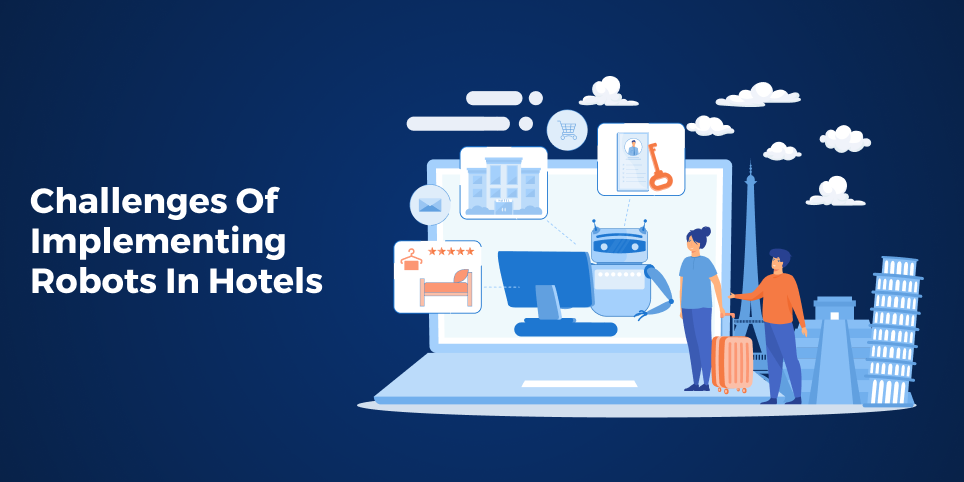
The obstacles and challenges related to robots in hotels are many. One of the greatest challenges is the cost of maintaining and implementing robotic infrastructure. Lack of standardization is another challenge. There do not exist any industry-wide standards for hotel robots that make it difficult for hoteliers to select and compare the right robot for their requirements. The issue is also with public perception. Most people view these robots as a threat to their jobs. Others might view them as a nuisance. Some tasks, like addressing questions which have previously not been programmed by the staff, would require to be addressed by any human. Another drawback is that the maximum number of guests today also wish to enjoy the human touch during their stay. This handful of patrons might not appreciate the cold nature of the most advanced robots in the hotels. If we put it simply, most robots are not capable of delivering a truly personal touch.
Wrapping up
In spite of the challenges, hotel robotics’ future is really bright. The worldwide market of a hotel is projected to grow. The growth is driven by the enhanced adoption of robots in the hotel industry and the growing necessity for cost-effective and efficient solutions. Hotels nowadays are turning to robots to improve operations as well as to enhance the guest experience. Also, with AI, the future looks quite promising. It uses several tools, such as natural language processing, pattern recognition, and data mining. For some time, various progressive hotels have been leveraging AI-powered tools to automate the process, reduce costs, cut-down errors, locate patterns and insights, analyze critical data, and automate the process. They have been a huge value in everything from guest service to marketing, sales, and revenue management.



